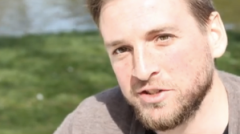By Karen Springsteen
In the recent column, “On War, Guilt, and ‘Thank You for Your Service,’” West Point Professor Elizabeth Samet argues that the ritual of thanking the troops for their service is a “poor substitute for something more difficult and painful—a conversation about what war does to the people who serve and the people who don’t.”
That conversation often comes about when citizens—out of concern, curiosity, or too many beers—have the desire to ask: “So, did you see any action?” “What was it like over there?” Or the lesser-spoken (I hope) “did you ever kill anyone?” To many veterans, such questions may be foolish and offensive or smack of some kind of voyeurism.
In the gentle words of former Marine and now professor Galen Leonhardy, “asking a person whether he or she has killed another person does seem to push the limits of propriety” (349). Yet, “action” (combat, killing) is a truth of war. It is as undeniable as it is ineffable (overwhelming, beyond words): faced with the mortal realities of more than a decade of war, how many of us—veterans and civilians—turn off, tune out, go numb?
With a new feature length documentary titled “Veteran ‘On Killing,'” (VOK) Iraq veteran Zach P.  Skiles, offers a way to reconnect. He shares the voices and faces of veterans as they read and respond to passages from Lieutenant Colonel David Grossman’s book, On Killing: The Psychological Costs of Learning to Kill in War and Society, which Skiles read while staying at the Pathway Home PTSD clinic in Northern California. By first reading a passage from the book aloud for the camera and then offering his or her own perspective on that passage, twelve veterans (of Iraq, Afghanistan, Vietnam, and Kosovo) bring Grossman’s research to life.
Skiles, offers a way to reconnect. He shares the voices and faces of veterans as they read and respond to passages from Lieutenant Colonel David Grossman’s book, On Killing: The Psychological Costs of Learning to Kill in War and Society, which Skiles read while staying at the Pathway Home PTSD clinic in Northern California. By first reading a passage from the book aloud for the camera and then offering his or her own perspective on that passage, twelve veterans (of Iraq, Afghanistan, Vietnam, and Kosovo) bring Grossman’s research to life.
When, for example, Grossman writes about how citizens today are mostly insulated from death (our meat is pre-packaged, medicine prolongs life, mortuaries take care of our dead), Iraq veteran Jose Arias reflects on how death is treated in war, discusses how “our honor code prevented us from talking about it,” and suggests that “we create the bubbles we want to live in.” When Grossman cites the term “operant conditioning” from B.F. Skinner’s work, Iraq veteran Mack Butler follows up by talking what had become “natural” from his training. Relating an experience from combat, he talks about the “path of least resistance” and the power of automatic, as if instinctual, response.
In another passage, read by Skiles, Grossman uses the term “combat exhaustion” to describe a scenario in which the current physical and logistical ability to sustain combat outstrips humans’ psychological capacity to endure it. Grossman notes that never before have troops had to stay in such a continual state of fight-or-flight, and seldom did they experience such high levels of imminent personal risk without respite. In response to this passage, Skiles tells us that, in his first two weeks in country in 2003, he got eleven total hours of sleep, a point about sleep deprivation echoed by Javier Juarez, a veteran of Kosovo and Iraq: “when I came back and I would tell people I didn’t sleep for a year, physically you might’ve but even then your brain didn’t.” The vigilance and danger has been so extreme that, as Iraq veteran Irwing Lazo puts it in the film, “in a sense, you have to play like you’re dead already”—a practice that Lazo sees extending into veterans’ postwar lives as well.
Sitting on their porch, two veterans (not identified by name in the film) tell us that the effects of such service aren’t as noticeable “until you get out and maybe are a civilian” “I think it’s been promoted, like, I think in the military it’s better to be wound up and uptight.” The practice of militaries committing “psychological warfare” upon their own troops is addressed by Grossman in a passage to which Iraq veteran Tasia Flores responds:
It’s much like in basic training when you do say ‘kill, kill, kill.’ It’s just another word … but reading this book, I see how it can affect people, you know. Learning that ‘kill’ is not a bad word to knowing, like, yes it is, and it has a profound ripple effect not only on my life or the person that was affected by it, but their family and, you know, their community.
As a collective voice, the personal reflections and real responses to Grossman’s work that are captured by this documentary speak to the larger historical, psychological, and moral context of war and post-traumatic “stress” (which now seems like too plain a word). The documentary teaches us that veterans’ problems coming home from war are not pinned to individual defect or aberration and that no vet is alone in feeling the embodied effects left over from a military’s systematic, years-in-the-making, training apparatus. In this way, Zach P. Skiles’ “Veteran ‘On Killing’” is humane, powerful, and humbling.
Currently, the documentary can be found on Youtube as an eight-video playlist, each of which is 9-12 minutes long and has received anywhere from 75 to 576 hits. Please watch, learn, and share with veterans who may be transitioning into or out of service.
References
Grossman, David. On Killing: The Psychological Costs of Learning to Kill in War and Society. Boston: Little, Brown and Company, 1995. Print.
Leonhardy, Galen. Transformations: Working with Veterans in the Composition Classroom. Teaching English in a Time of War. Spec. issue of Teaching English in the Two-Year College 36.4 (2009): 339–52. Print.
Samet, Elizabeth. “On War, Guilt and ‘Thank You for Your Service.’” Bloomberg.com. Bloomberg LP. 1 April 2011. Web. 6 Nov 2013.




